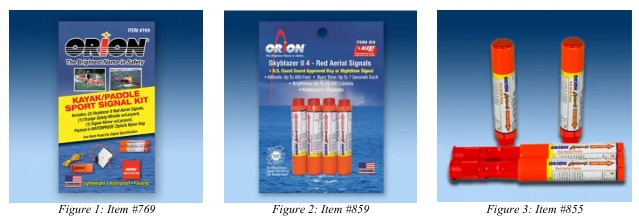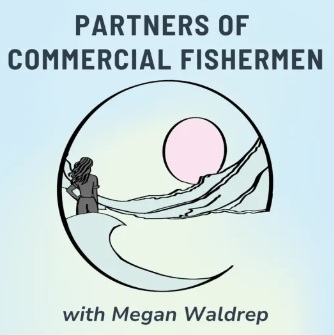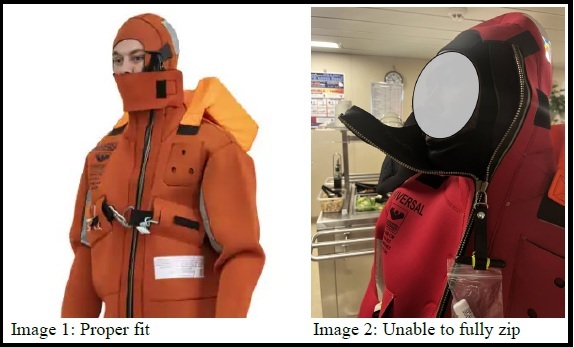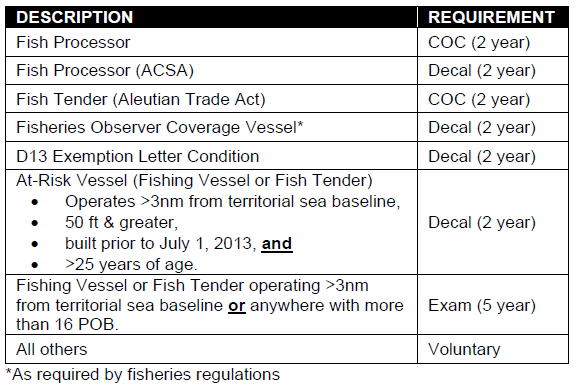
Comments may be directed to Mike Rudolph Michael.G.Rudolph@uscg.mil.
A web site for the Commercial Fishing Vessel Industry
|
Quick linksContacts Got Questions? Here is a contact list of Coast Guard commercial fishing vessel safety examiners across the countryCoast Guard Districts MapJob Aids NWD CFVS Examiner's Reference Guide 2024Dockside Examiner's Stability Reference Guide, Stability Compliance Checklist and Freeing Port Calculator latest updates July 2024.Commercial Fishing Industry Vessels Best Practices Guide (updated December 2024).Videos Northwest Disrict YouTube channelAMSEA YouTube channelAMSEA How to Operate Signal FlaresAccident Reports Link to Coast Guard Casualty ReportsFV SCANDIES ROSE Accident Investigation ReportFV DESTINATION Accident Investigation ReportALASKA JURIS Accident Investigation ReportSafety Advisories & Notices NEW--Marine Safety Alert December 24, 2025 - Recall of Orion Skyblazer II Red XLT Aerial Signal;Marine Safety Information Bulletin September 9, 2025 - Pot Fishing Vessel Deck Safety and Hazards;Marine Safety Alert March 12, 2025 - Donning of Viking PS2006 Immersion Suits;Findings of Concern - "Impacts of Modifications, Alterations and Weight Creep on Stability"Marine Safety Alert Oct. 6, 2017 - Vessel Stability - Remain upright by fully understanding vessel stability.Marine Safety Alert Aug. 17, 2016 - Coast Guard releases reminder to trawlers and other vessel that work the ocean floor about discarded munitions.Marine Safety Alert Aug. 9, 2016 - Reminder about hazardous atmospheres in holdsMarine Safety Information Bulletin July 20, 2016 - Suspends development of Alternate Safety Complaince Program (ASCPs) for voluntary safety guidelines.Surviving falls overboardFatigue is deadly - How to manage it.Link to the new Coast Guard Headquarters Fishing Vessel Safety Website www.dco.uscg.mil/fishsafe |
Recall of Orion Distress SignalsPosted December 29, 2025-The manufacturer of the Orion Skyblazer II Red XLT Aerial Signal issued a recall for specific devices due to three (3) incidents of spontaneous combustion. Subsequently, the U.S. Coast Guard has issued Marine Safety Alert 21-25 to inform mariners and anyone who may have the distress signals in their posession or onboard their vessels. For more information and what to do if you have these signals, here is a link to Orion Signals' recall page. 
Updated ACSA InformationPosted December 9, 2025-Checkout the Alternate Compliance Safety Agreement (ACSA) page for posted updates to the ACSA Guide, 840 Examination Book, ACSA Exemption Request Letter (template) and minutes from the September 2025 stakeholder's meeting. Pot Fishing Vessel Deck Safety and HazardsPosted September 9, 2025-MSIB 01-25 Pot Fishing Vessel Deck Safety and Hazards. Coast Guard Arctic District issued a Marine Safety Information Bulletin bringing deck safety and risks associated with fishing vessels that use pots. Another good source for safety information is Deck Safety for Crab Fishermen Pamphlet developed by Jensen Maritime Consultants in 2002. 
New Examination Form and Supplements ReleasedPosted August 17, 2025-CG-5587 CFVS Exam Form 2025. Headquarters (CG-CVC-3) has released the latest version of the CG-5587-Commercial Fishing Vessel Safety Examination Form that includes supplements for vessels >100 GT, stability compliance for vessels 79 ft or greater, oil transfer compliance checklist for vessels with 10,500 gallon or greater capacity of oil products, and new construction compliance for fishing and fish tender vessels with a keel laid date after July 1, 2013 (includes 4503(d) alternate-to-class compliance checklist). Subpart D Addendum is here. (for vessels keel laid or major conversion after 9/15/1991 and more than 16 POB). Checklist for Aleutian Trade Act Fish Tenders is here. Partners of Commercial Fishermen Podcast InterviewPosted August 1, 2025-Two-Part Podcast (link) Partners of Commercial Fishermen host Megan Waldrep interviews CFVS Examiner Steve Kee (Sector Columbia River-Detached Duty North Bend, OR). In this 2-part podcast Steve discusses the aspects of the Dockside Examination program, importance of wearing personal flotation devices, the influence a spouse or partner can have on the safety culture of the fishermen on board, and a special offer from Steve about the stowage and hook-up of your inflatable liferaft. 
Coast Guard District 13 renamed to Northwest DistrictPosted July 14, 2025-District 13 renamed to Northwest District (press release) The U.S. Coast Guard announced the renaming of its operational districts from numerical to geographic designations, a key initiative under Force Design 2028 (FD2028). Within this Service-wide renaming initiative, Coast Guard District 13 will now be known as Coast Guard Northwest District. 
Marine Safety Alert-Viking Immersion SuitsPosted March 13, 2025-MSA 09-25 Donning of Viking PS2006 Immersion Suits The Coast Guard was recently notified of several vessels whose mariners were unable to properly don their Viking PS2006 immersion suits. Mariners are advised to ensure proper fit and function of each suit for each person on board prior to operations. 
PFD Harmonization--Final Rule PublishedPosted February 20, 2025-Federal Register Final Rule December 6, 2024. The Coast Guard completed the harmonization of Personal Flotation Device approvals and descriptions with that of Transport Canada. The new rule changes the approval process, labeling, performance and carriage requirements for ALL vessels. Gone are the descriptive types for PFDs (Type I, II, III, IV and V) and replaced with specific approval numbers, and new labeling that describes the specific activity the PFD is intended for, buoyant force (in N) and if it has righting abilities. Existing PFDs are acceptable provided they are still in serviceable condition. Updated-Best Practices GuidePosted January 27, 2025-Commercial Fishing Industry Vessels Best Practices Guide (updated December 2024). This guide was developed in collaboration with owners of fishing vessels, safety organizations, the Coast Guard and the National Commercial Fishing Safety Advisory Committee (NCFSAC). It provides safety recommendations to address identified risks within the fishing industry based upon careful analysis of vessel casualties and personnel fatalities and inuries. Finding of Concern--Fouled Propeller and Emergency TowingPosted October 31, 2024-Sector Western Alaska & US Arctic issued a Finding of Concern to alert mariner's to be aware of obstructions in the water that can foul the propulsion or steering systems. And to be prepared for situations that might require emergency towing to avoid further damage or loss of the vessel.Finding of Concern 009-24 New Construction PolicyPosted August 26, 2024-The Coast Guard's office of Commercial Vessel Compliance-Fishing Vessel Safety Division (CVC-3) released a policy on the process and procedures for the construction of new fishing and fish tendering vessels 50 to 180 feet in length. New Construction Policy Letter 24-02 When is a CFVS Exam required and when does it need to be updated?Posted July 29, 2024-Depending upon several factors, some Commercial Fishing Industry Vessels are required to maintain a valid CFVS Decal (every 2 years). Or a valid Certificate of Compliance (COC) (every 2 years). While others are required to complete a CFVS exam every 5 years. Or may choose to complete a CFVS exam or maintain a valid CFVS Decal voluntarily. The following graphic should better explain: 
Updated D13 CFVS Reference Guide for 2024.Posted June 19, 2024-The latest edition of the Coast Guard District 13 Commercial Fishing Industry Vessel Safety Reference Guide has been released. This guide is used by examiners as a resource, alongside other job aids and published policies, while conducting Part 28 exams or at-sea boardings.D13 CFVS Reference Guide 2024 SCANDIES ROSE Report of Investigation and Operational Safety Information for Commercial Crabbing VesselsThe Coast Guard released its final Report of Investigation into the sinking of the FV SCANDIES ROSE. SCANDIES ROSE Report. The Marine Board also issued a pamphlet outlining safety information for crabbing vessels. Crabbing Safety Pamphlet. Notice of proposed rulemaking: Electronic chart and navigational equipment carriage requirementsThis advance notice of proposed rulemaking (ANPRM) outlines the Coast Guard’s broad strategy to revise its CFR chart and navigational equipment carriage requirements to implement statutory electronic-chart-use provisions. This ANPRM is necessary to obtain additional information from the public before issuing a notice of proposed rulemaking. Click here to access this notice. Notice: Recording of the Microsoft Teams meeting to discuss Fish Tender Vessels that require a Loadline.The meeting took place Thursday May 26, 2022. Click here to access the recording of the meeting and related documents for the meeting. Notice of proposed rulemaking: Electronic chart and navigational equipment carriage requirementsThis advance notice of proposed rulemaking (ANPRM) outlines the Coast Guard’s broad strategy to revise its CFR chart and navigational equipment carriage requirements to implement statutory electronic-chart-use provisions. This ANPRM is necessary to obtain additional information from the public before issuing a notice of proposed rulemaking. Click here to access this notice.
|